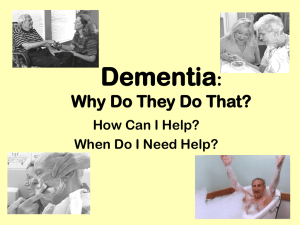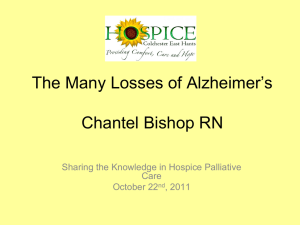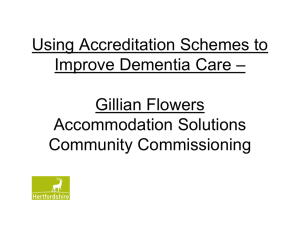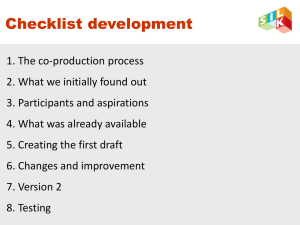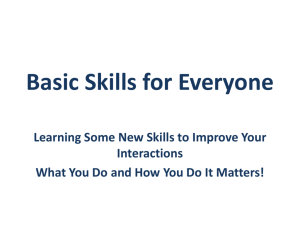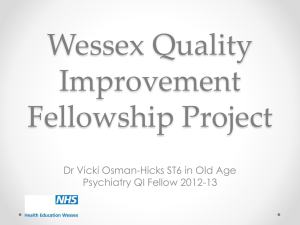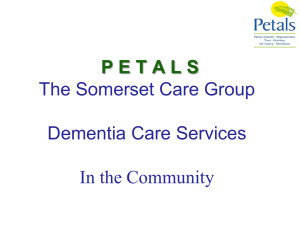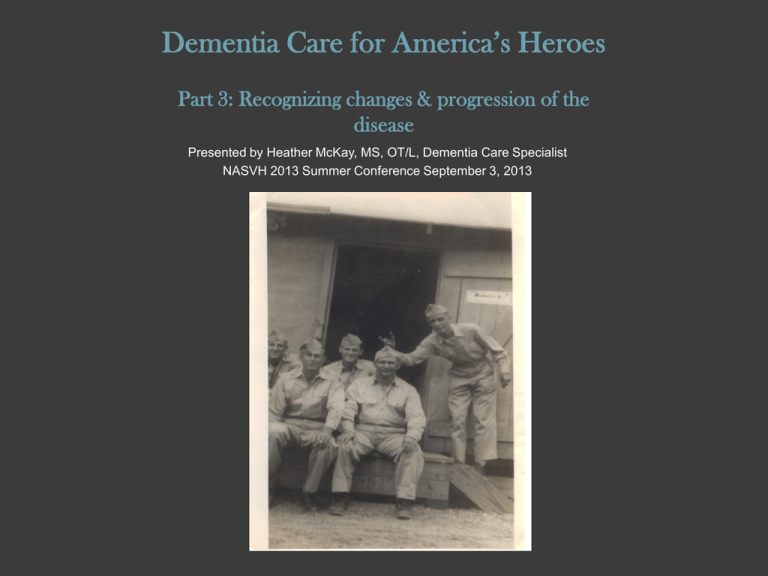
Dementia Care for America’s Heroes
Part 3: Recognizing changes & progression of the
disease
Presented by Heather McKay, MS, OT/L, Dementia Care Specialist
NASVH 2013 Summer Conference September 3, 2013
Brain atrophy
Brain actually shrinks
Cells wither then die
(darker color)
Sick cells are unreliable
Fluctuation happens at
all levels
Some types of dementia
are predictable while
others are “patchy”
Each person’s
experience is individual
Memory Loss
Losses
Situational memories
Immediate recall
Relationships
Motor memories
Preserved abilities
Long ago memories
Confabulation (re-writing
history)
Emotional memories
Understanding
Losses
Information words
Explanation of the facts
Preserved abilities
Understands facial
expression
Understands tone of voice
Understands gestures
May act like she understands
when she doesn’t
Language
Losses
Can’t find the right words
Can’t explain the situation
Vague language
Single phrases
Sounds & vocalizing
Can’t make needs known
Preserved abilities
Singing
Automatic, social speech
Swearing/sex
words/forbidden words
Impulse & Emotional Control
Losses
Social graces aren’t what
they used to be
Think it - say it
Like it - do it
See it - take it
Preserved
Desire to be respected
Desire to be in control
Holding on to feelings
Measuring with different tools
3-level: Early, Middle, Late
7-level: Global Deterioration Scale
5-level: Cognitive Disabilities Scale
(Allen Cognitive Levels)
Progression of Cognitive Loss
Many assessment tools
What is lost & retained
What is typical behavior
What helps & works
Levels 5-1
Progression of the disease
6 is normal-that’s you!
5 is earliest stage and 1 is the lowest at
the end of the disease
We’ve all been a 5
Stress UP>brain function DOWN
Level 5 - Routines & Repeats
Earliest signs of
change
Repeats stories
Logic problems
“My way”
Very ‘independent’ or
seeking constant
reassurance
Resents take-over
Confused about the
schedule
Can follow prompts and
reminders
Has trouble with new
routines and locations
Becomes anxious and
frustrated easily
Tries to maintain control &
social behavior
Routine, routine, routine
Caregivers learn to say,
“I’m sorry, you’re right”
Level 4 - Task Oriented
Wants to “just get it done”
Has trouble sequencing the
steps
Skips steps
Believes they can do it
‘Don’t need your help’
Information language is
poor
Has a mission in mind
Can’t find the bathroom, so
he urinates in the floor
Can follow simple gestures
and demonstration
Uses visual information to
figure out what to do
Asks the same question
again and again
High risk for elopement
Needs a good caddy
3 C’s of level 4:
Coverage
Communication
Car
Level 3 - Exploring
Needs step-by-step guidance for
personal care
Needs hands-on help to get started
or go from place to place.
Follows demonstration and handunder-hand guidance
After a few steps, the person may
be able to continue on their own-for
a few minutes
Hands are busy touching, handling
everything
Will not recognize others’ space or
belongings
Will strip clothes when it’s hot!
Imitates actions, repeats
actions over and over
Follows others & caregiver
Does activities that look or
sound or taste good
Leaves places or activities that
are TOO busy or crowded
May taste or eat what they see
Has trouble transitioning
between activities
Sleep cycle changes
Hand-under-hand position
Level 2 - Stuck on GO or STOP
Automatic actions only
May carry items, rub/
pat/clap with hands
Limited visual
processing
Very limited
communication skills
Can’t get started, then
can’t stop
Imitates your general
movements
Can’t grade strength
Better with rhythm and
repetitive movements
Needs hand-underhand for self care and
walking
Poor appetite, eats and
drinks less
Sleep cycle changes
Level 1 – Reflexes Rule
Bed bound or chair bound
Sleeping more
Looks or listens at times,
when awake
Holds objects or
rubs/claps/pats with
assistance
Responds to massage,
stroking, smells, colors, lightsinconsistently
Lots of reflexes
Grabs/grasp but can’t let go
Needs maximum help to do
all self care and transfers
May vocalize sounds for
pleasure or stress
May make facial grimaces
Muscles shorten
May feel stiff and sore
Difficulty swallowing
Difficulty fighting infections
High fall risk when out of bed
Sensitive to familiar, calm
voice
Breathing changes
Moments of being present
“We are following his lead”
Detective work at every level
Supporting people as they change
Mobility problems?
Pain?
Sensory problems?
Mental health issues?
Other diagnoses of importance?
Believe
People with dementia are doing the BEST they can!
Contact Information
Heather McKay
Partnerships for Health
www.pfhnc.com
Click “contact us”
(919) 260-5986
heather@hospiceac.org
Video Training Tools: Dementia Care for America’s Heroes
Order online at www.pfhnc.com

